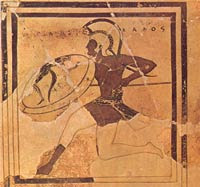
Day 1, Lesson 1: History of the Marathon
Among all the Olympic sport events, the Marathon Race stands out as it was born by a true historic and heroic event.
It was a true triumph accomplished by a news-bearing foot soldier from ancient Athens, who announced - with his last words - the victory of the Greeks against the Persians during the Marathon Battle in 490 BC.
The 42,195m Marathon Race became one of the most competitive events during the revival of the Olympic Games in 1896. A Greek athlete named Spyros Louis, running what has ever since been referred to as the Original Marathon Course from the ancient city of Marathon to the Panathinaikon Stadium in Athens, won the gold medal of the first modern Olympic Games and became a legend of Greek and International Athletics. The Marathon Race has always had a prominent place in the hearts and minds of sports enthusiasts, as it represents the highest effort where the human body, soul and mind are tested to their limits as the runner presses himself/herself to reach the finish line.
SEGAS, the Hellenic Athletics Federation, has the honour and the historic responsibility to organize annually the Athens Classic Marathon on the Original Marathon Course. Since 1982, the Athens Classic Marathon has been dedicated to Gregoris Lambrakis, the athlete, scientist and Member of Parliament, who was murdered in the 60s and, by his death, became a symbol of Human Rights.
Thousands of runners from all over the world are expected to participate in this year's race. Apart from the sporting experience, they will have the chance to enjoy the traditional Greek hospitality, discover the fascinating landscape of our country and explore a city which is constantly improving its standards.
Every time someone runs a marathon, they metaphorically retrace steps taken during one of the most momentous events in world history, the Battle of Marathon in 490BCE. A few thousand Athenian and Plataean soldiers, led by the warrior Miltiades destroyed a huge force of invading Persians on the plain of Marathon, a victory widely acknowledged to have ensured the democratic legacy of Western culture.
The significance of the Hellenic victory has not gone underestimated, either then or now. The poet and dramatist Aeschylus fought at Marathon (his brother was one of the 192 dead, compared to thousands of Persians). But when Aeschylus died, not one word of his literary achievements made it onto his tombstone, only the fact that he had fought at Marathon.
Similarly, though every schoolchild in the UK knows how the Battle of Hastings in 1066 altered the course of British history and culture, the celebrated 18th century philosopher and political theorist John Stuart Mill maintained that, in the grand scheme of things, ‘Marathon’ was a far more important event to Britons than ‘Hastings’.
However, the tale that most people know about events in 490BCE is that a messenger named Phillipides or Pheidippides ran from Marathon to Athens to announce the victory, then collapsed and died. Out of that legend, the marathon race was born.
But the original legend, whose first report was 600 years after the battle (thus highly questionable) was that the messenger first went to Sparta to ask for help, was rebuffed, and ran back to Marathon, before going to Athens to announce victory. Dying after a trek like that made far more sense, since the round trip, across impossibly rough, hilly terrain (and no tarmac roads 2500 years ago) is around 500 kilometres, and he did it allegedly in two or three days.
Which is why every long distance runner in the world should want to run from Marathon to Athens at least once.
And if you haven’t done it yet, or even if you have, then next year is the year. For 2010 is the 2500th anniversary of the Battle of Marathon. And the organisers of the Athens Classic Marathon, on October 31, 2010 are preparing for another invasion, but a friendly one this time.
The race has had a chequered history since effectively being launched with, not the inaugural modern Olympic race, but with a trial race on the same course a few weeks before, in spring of 1896. But while the Boston AA launched their own race the following year, and have staged it in one form or another (a relay during wartime) for a century and a dozen years since then, Athens has had a history of hiccups, ie on and off, and on again. At one time, there were two a year, one in Spring, the other in Autumn. But in its latest incarnation, next year will be the 28th edition of the Athens Classic Marathon.
The elite race has been relatively low-key until recent years, getting a pre-Olympic boost in 2000 by sponsorship from Alpha Bank, who still remain principal sponsor nine years later. But overall marathon numbers have stayed relatively small, due partly to restricted space at the start area in Marathon, and for reasons of safety at the marble Panathinaiko stadium, built for 1896, in Athens.
There were around 3,600 finishers in 2009. But a provisional limit of 10,000 (roughly the same as the Hellenic army in 490BCE) has been mooted for 2010 with a possibility of up to 13,500.
If you’ve not run the course, be warned, it’s one of the most difficult of the modern popular marathons. After a relatively flat first 10k, which takes runners on a detour around the tumulus (burial ground) of the Athenian dead - the Parthians have their own burial ground - the course rises until around 32k.
So half the race is uphill. But then the last part is downhill all the way.
Bit like life, really.